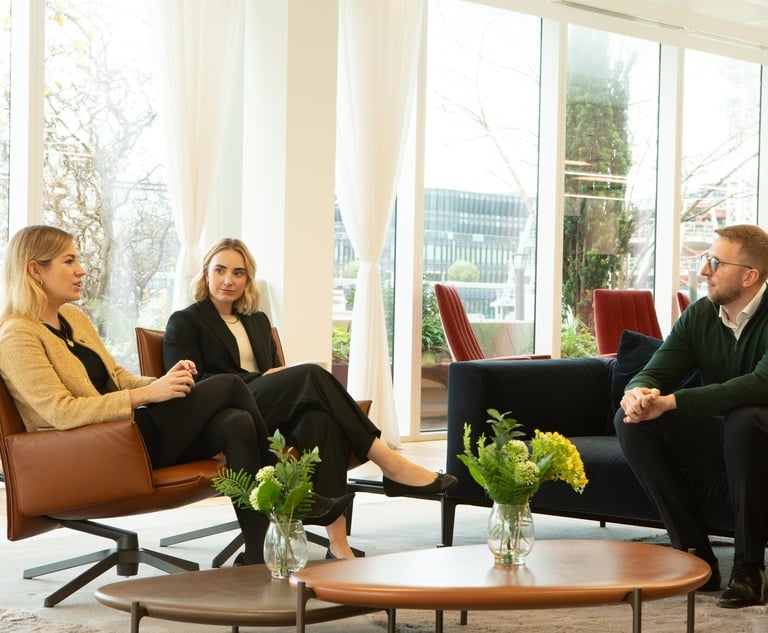 Top row (L-R): Ali Sallaway, Elizabeth Robertson, Eve Giles and Jo Rickards; bottom row (L-R): Judith Seddon, Kathleen Harris, Louise Delahunty and Nichola Peters
Top row (L-R): Ali Sallaway, Elizabeth Robertson, Eve Giles and Jo Rickards; bottom row (L-R): Judith Seddon, Kathleen Harris, Louise Delahunty and Nichola PetersTop tier: the sector where women already rank among the stars
The story behind a generation of women's ascent to the top ranks in white collar crime
January 15, 2019 at 12:00 AM
6 minute read
As law firms grapple with the challenge of getting more women into senior roles, there is one sector where they already rank among the most influential in their field. In the decade since the financial crisis, a cohort of female lawyers has made its way to the top of some of the most preeminent white-collar crime practices in the City.
When it comes to star female lawyers, white-collar compares favourably to many other mainstream sectors. Chambers & Partners lists 13 women among its top four bands, whereas in other quarters of the corporate world women have struggled to acquire the same standing. In private equity, for example, just two senior women are listed within the top tiers, while M&A tallies four, and banking and finance a slightly better seven.
Among the highest-ranked in white-collar are Skadden Arps Slate Meagher & Flom's Elizabeth Robertson, Ropes & Gray's Judith Seddon and Herbert Smith Freehills partner Susannah Cogman, while other examples include Jenner & Block's Christine Braamskamp and Arnold & Porter's Kathleen Harris.
So why have so many women achieved such prominence in this sector, while in other areas of law the struggle for gender parity persists?
Part of the reason seems to be the route these particular lawyers have taken to rise to the top. Many cut their teeth at boutiques specialising in corporate crime before joining larger firms.
"Post-financial crisis, it was impossible for a big firm not to [need] a competent specialist lawyer who could deal with criminal matters, sanctions and internal investigations," says Skadden's Robertson. "And the place to find the people with the kind of depth of experience needed was in the boutiques."
She describes these places as "an incredible nurturing bed" for senior women in white-collar crime.
There are many senior, powerful women in white-collar who influence what's happening today
Robertson herself moved to Addleshaw Goddard from City boutique Peters & Peters in 2007, quick on the heels of Cooley's Louise Delahunty, who also left the corporate crime specialist firm for Simmons & Simmons in 2006 before later joining Sullivan & Cromwell.
This was followed by similar moves by regulatory heavyweights such as Ropes & Gray's Seddon, who joined Clifford Chance in 2008 from legacy Russell Jones & Walker, and Jo Rickards, who joined DLA Piper from Peters & Peters in 2009 and now heads up the white-collar team at Mishcon de Reya.
Crucially, they say these boutiques afforded flexibility to women at a time when many were starting families.
"At Kingsley Napley I was the first female solicitor in the criminal litigation department to have children and return to work," says Eve Giles, who this summer left Kingsley Napley to join Allen & Overy. "I was promoted to partner while I was on maternity leave, and this meant a lot to female associates who wanted to start families but were worried about the impact it might have on their careers."
Similarly, Robertson says: "I worked a four-day week for 10 years at a boutique, and that continued when I moved to the City.
"In the smaller firms there can be a culture of learning by doing more business development. I was expected to bang the drum for business. That gave me the skills to flourish in an elite firm like Skadden where you're expected to develop client relationships." She adds that the progression of women in this sector showed it was possible to work flexibly and be successful in big law firms.
White-collar characteristics
But it is not just the benefits of starting off in a boutique that have helped women progress. Various successful women in the sector also point to personality traits that lend themselves to investigations work.
According to Giles, this area of law "has a real human side – you are seeing people at their most vulnerable". She explains: "Many women I know are very good on detail and analysis; they're not shy to go through the evidence in fine detail, not afraid of asking searching questions. They have the ability to say, 'that doesn't really make sense', but to also deliver the tough messages in a compassionate way, which may include 'you won't be believed by a jury and need to consider your position'."
She adds: "People can in certain other areas be overly competitive, and it's often about the winning and not the client."
For Addleshaws global investigations head Nichola Peters, investigations work requires a "sixth sense". "It's about understanding how people tick."
And the teamworking and collaborative skills required to succeed can also suit women, according to Freshfields Bruckhaus Deringer global investigations co-head Ali Sallaway.
White-collar crime advice requires plenty of collaborative working, she says, which can even go as far as working together across firms. "Lawyers working in white-collar tend to be good at collaborating and referring work to each other – there is a lot of mutual respect."
She also underlines the importance of "emotional and strategic intelligence, sensitivity and integrity", a well as "a great team and a healthy dose of luck".
Looking up
There is also a self-replicating aspect to the number of senior women in the sector because it offers younger women role models as inspiration.
One female partner at a City firm describes these as "the role models the legal sector craves".
Addleshaws partner Michelle de Kluyver says: "There are a lot of role models in this area. Many senior, powerful women who influence what's happening today. Women like Elizabeth Robertson and Judith Seddon – and others – have been inspirational role models for a lot of people and are great champions for women."
Men also have an important role to play, according to Giles, who names former Kingsley Napley senior partner Christopher Murray and current WilmerHale partner Stephen Pollard as her role models.
Either way, Addleshaws' Peters adds: "To be able to see someone above you who resemble you – this is very important. We now have very senior women holding significant offices."
But Seddon believes nothing matters as much as basic grit and resolve. Progression requires "hard work, determination and courage not to be deterred by obstacles" that you will inevitably encounter, she says – "particularly as a woman".
This content has been archived. It is available through our partners, LexisNexis® and Bloomberg Law.
To view this content, please continue to their sites.
Not a Lexis Subscriber?
Subscribe Now
Not a Bloomberg Law Subscriber?
Subscribe Now
NOT FOR REPRINT
© 2025 ALM Global, LLC, All Rights Reserved. Request academic re-use from www.copyright.com. All other uses, submit a request to [email protected]. For more information visit Asset & Logo Licensing.
You Might Like
View All
Paul Weiss Says Progress Means 'Embracing the Uncomfortable Reality'
5 minute read

GCs Say They are Getting 'Edged Out' of UK Boardrooms
Trending Stories
Who Got The Work
Michael G. Bongiorno, Andrew Scott Dulberg and Elizabeth E. Driscoll from Wilmer Cutler Pickering Hale and Dorr have stepped in to represent Symbotic Inc., an A.I.-enabled technology platform that focuses on increasing supply chain efficiency, and other defendants in a pending shareholder derivative lawsuit. The case, filed Oct. 2 in Massachusetts District Court by the Brown Law Firm on behalf of Stephen Austen, accuses certain officers and directors of misleading investors in regard to Symbotic's potential for margin growth by failing to disclose that the company was not equipped to timely deploy its systems or manage expenses through project delays. The case, assigned to U.S. District Judge Nathaniel M. Gorton, is 1:24-cv-12522, Austen v. Cohen et al.
Who Got The Work
Edmund Polubinski and Marie Killmond of Davis Polk & Wardwell have entered appearances for data platform software development company MongoDB and other defendants in a pending shareholder derivative lawsuit. The action, filed Oct. 7 in New York Southern District Court by the Brown Law Firm, accuses the company's directors and/or officers of falsely expressing confidence in the company’s restructuring of its sales incentive plan and downplaying the severity of decreases in its upfront commitments. The case is 1:24-cv-07594, Roy v. Ittycheria et al.
Who Got The Work
Amy O. Bruchs and Kurt F. Ellison of Michael Best & Friedrich have entered appearances for Epic Systems Corp. in a pending employment discrimination lawsuit. The suit was filed Sept. 7 in Wisconsin Western District Court by Levine Eisberner LLC and Siri & Glimstad on behalf of a project manager who claims that he was wrongfully terminated after applying for a religious exemption to the defendant's COVID-19 vaccine mandate. The case, assigned to U.S. Magistrate Judge Anita Marie Boor, is 3:24-cv-00630, Secker, Nathan v. Epic Systems Corporation.
Who Got The Work
David X. Sullivan, Thomas J. Finn and Gregory A. Hall from McCarter & English have entered appearances for Sunrun Installation Services in a pending civil rights lawsuit. The complaint was filed Sept. 4 in Connecticut District Court by attorney Robert M. Berke on behalf of former employee George Edward Steins, who was arrested and charged with employing an unregistered home improvement salesperson. The complaint alleges that had Sunrun informed the Connecticut Department of Consumer Protection that the plaintiff's employment had ended in 2017 and that he no longer held Sunrun's home improvement contractor license, he would not have been hit with charges, which were dismissed in May 2024. The case, assigned to U.S. District Judge Jeffrey A. Meyer, is 3:24-cv-01423, Steins v. Sunrun, Inc. et al.
Who Got The Work
Greenberg Traurig shareholder Joshua L. Raskin has entered an appearance for boohoo.com UK Ltd. in a pending patent infringement lawsuit. The suit, filed Sept. 3 in Texas Eastern District Court by Rozier Hardt McDonough on behalf of Alto Dynamics, asserts five patents related to an online shopping platform. The case, assigned to U.S. District Judge Rodney Gilstrap, is 2:24-cv-00719, Alto Dynamics, LLC v. boohoo.com UK Limited.
Featured Firms
Law Offices of Gary Martin Hays & Associates, P.C.
(470) 294-1674
Law Offices of Mark E. Salomone
(857) 444-6468
Smith & Hassler
(713) 739-1250








